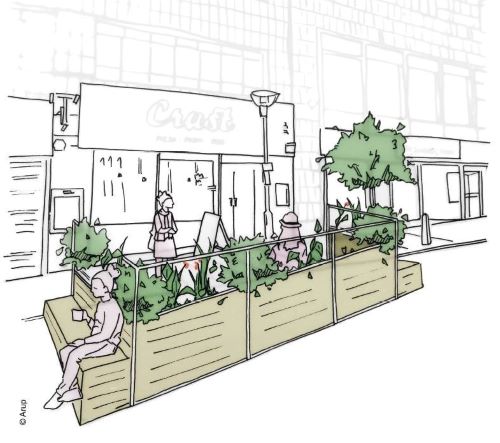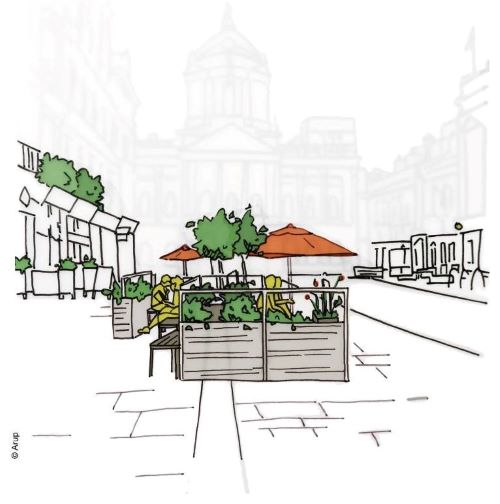Keeping people safe as the hospitality sector opens its doors after a long lay-off is challenging but Arup is working on a solution in Liverpool that could be rolled out nationwide, says Jonathan Mottershead.
No sector can boast complete immunity from the effects of this global pandemic but there can be no doubt that the hospitality industry has been one of the most severely impacted, after being forced to shut up shop back in March. This is particularly impacting independent businesses.
Now, as lockdown restrictions begin to ease, businesses up and down the country face a new hurdle as they prepare to reopen their doors; keeping both staff and customers safe in the age of social distancing, while battling to remain profitable.
And to counteract the internal space that bars and restaurants will be sacrificing in order to accommodate the new government guidelines, Arup has been working with the city of Liverpool to transform the public realm and make greater use of its streets, a scheme that could be rolled out across cities and towns nationwide.
As part of the Liverpool Without Walls (LWW) project, a joint initiative by Liverpool City Council, Liverpool BID Company and the Liverpool Chamber of Commerce, the redesign will not solely focus on placing tables and chairs on the pavements – but also make use of ‘parklets’ and the revitalisation of parking spaces into diverse green spaces, with communal seating to support business.

At Arup, we have long advocated the importance of green infrastructure in the planning and design of cities and urban environments and these parklets provide a quick and cost effective way to achieve this, while providing significant social, economic and environmental benefits for local communities.
Parklets originated in San Francisco in 2005 as an act of guerrilla art in public space and since then, have become a common feature in many cities around the world, with four distinct types, customisable to their respective surroundings. Traditional parklets are those that occupy a former parking space, loading bay or single traffic lane on the carriageway. Meanwhile, pavement parklets are in spaces off-road and do not require changes to traffic or road closures.
Street parklets usually close a whole street by placing planters and vehicle security barriers at the ends of the road so that seating and parks areas can be installed. And finally, bespoke parklets are considered for larger car parking areas or unusual, shaped spaces, impacting the character, look and feel of the local area. There are plans for nine traditional parklets to be installed on Bold Street in Liverpool over the summer, but there is the potential for this to be expanded even further across the city.
With regards to the design principles, our team of landscape architects and designers have considered segregation and zoning for social distancing, as well as screening to protect people. Meanwhile, the impact of certain weather elements has also been taken into account, including cover from rain, wind protection and potentially heating for winter months.
The modular parklets are intended to be easily swept up, cleaned and washed down with flexible furniture which can be easily moved. Meanwhile, the café style seating means that chairs and tables can be easily stacked for cleaning. This will also enable businesses to manage customer spacing more flexibly, such as catering for different group sizes. Built-in furniture can also be provided for longer term installations.
A key design output will also be the aesthetic quality and atmosphere the parklets create. Hardy, drought tolerant shrubs and perennials such as ivy, periwinkle, asters and lavender will be used to provide a variety of colour, textures and scents through the season, improving the look and feel of the local environment and inspiring a legacy for greener, healthier streets across the city.
It is crucial for them to be in keeping with the independent and creative nature of the local area, reflective of the culture of the city or the individual streets in which they are situated. We hope to work with local artists to provide a permanent sense of place and soul.

Indeed, the sense of community that these parklets produce will also be paramount and this must exist from the outset. There is the potential for local businesses to input into the selection of the greenery that is planted. For example, a restaurant may wish to plant edible herbs or to grow strawberries for use in the kitchen. And support in maintaining the parklets through watering will also be vital.
While initially this project is focused on supporting the reopening of the hospitality industry during Covid-19, this central aspect of community should ensure they leave a lasting legacy. The parklets have a five-year design life so after social distancing measures have been relaxed completely, the modular parklets can be changed to increase seating capacity or have the potential to be adapted for different uses or relocated elsewhere. We hope these parklets can quickly become part of the independent fabric of the streets in which they are situated, providing long-term benefits in reclaiming the streets for people and improving culture, health and wellbeing.
Jonathan Mottershead is an associate, transport consulting, at Arup.

